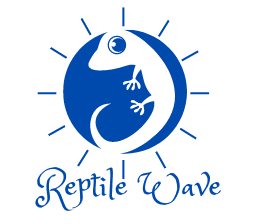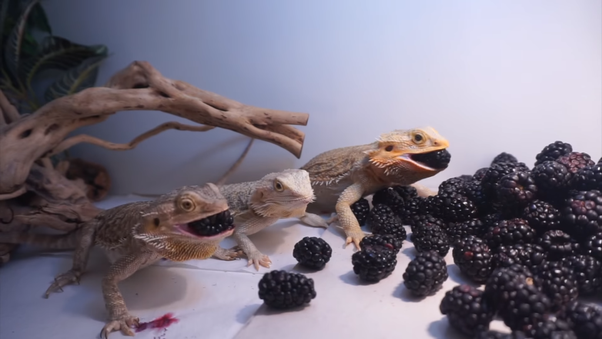Yes, bearded dragons can eat mulberries in moderation. Mulberries are a nutritious addition to their diet, providing essential vitamins and minerals, such as vitamin C, vitamin K, and potassium.
However, it’s important to offer them as an occasional treat and not a primary food source. Be sure to wash the mulberries thoroughly to remove any pesticides or contaminants.
Additionally, remove any stems and leaves, as they can be difficult for bearded dragons to digest. Feeding mulberries should be part of a balanced diet that includes other greens, vegetables, and insects. It’s essential to monitor your bearded dragon’s overall diet and health.
What Are The Nutritional Benefits Of Mulberries For Bearded Dragons?
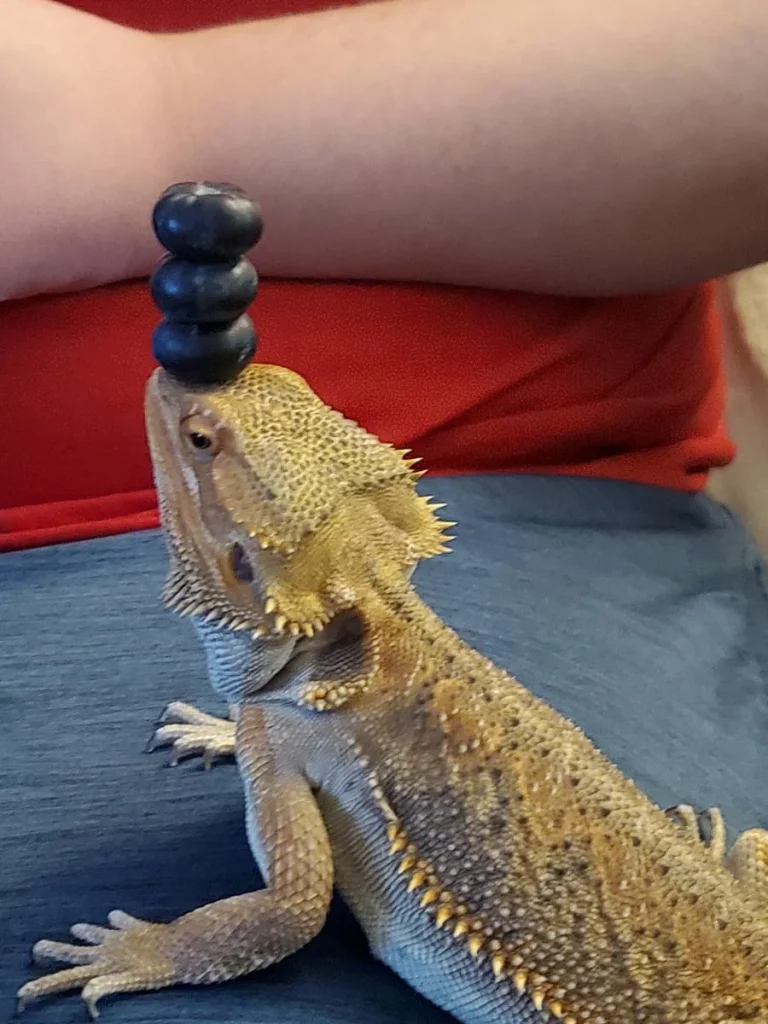
The nutritional benefits of mulberries for bearded dragons are significant. These berries are a rich source of essential vitamins and minerals, including vitamin C, vitamin K, and potassium, all of which contribute to a bearded dragon’s overall health.
The Nutrients And Vitamins In Mulberries
Vitamin C
Mulberries are particularly rich in vitamin C, a water-soluble vitamin known for its antioxidant properties. Vitamin C plays an important role in supporting a bearded dragon’s overall health. It aids in:
Strengthening the Immune System: Vitamin C is vital for a robust immune system, helping bearded dragons resist infections and diseases. It enhances their ability to fight off pathogens and maintain good health.
Promoting Healthy Skin: Vitamin C contributes to healthy skin and scales. Bearded dragons with adequate vitamin C are more likely to have clear, well-hydrated skin.
Enhancing Nutrient Absorption: This vitamin also assists in the absorption of other essential nutrients, ensuring that your pet receives maximum benefit from its diet.
Vitamin K
Vitamin K is essential for blood clotting and bone health. For bearded dragons, proper vitamin K intake is necessary in several ways
Blood Clotting: Vitamin K plays a key role in the blood-clotting process, preventing excessive bleeding from injuries or minor cuts.
Bone Health: Bearded dragons require strong bones to support their body structure and movement. Vitamin K contributes to bone density and strength, helping to prevent conditions like metabolic bone disease.
Potassium
Potassium is a vital mineral that is necessary for various bodily functions. Bearded dragons benefit from potassium in the following ways
Muscle Function: Potassium is essential for muscle contractions, which enable your pet to move, eat, and perform other essential activities.
Electrolyte Balance: Potassium helps maintain proper electrolyte balance in the body, ensuring that bodily functions, including nerve transmission, occur smoothly.
Fiber
Mulberries contain dietary fiber, which serves several purposes for bearded dragons. Dietary fiber aids in digestion by promoting regular bowel movements and preventing constipation. This is particularly important for reptiles like bearded dragons, as they may be prone to digestive issues if their diet lacks fiber.
How These Nutrients Can Benefit Bearded Dragons
Immune System Support: Vitamin C intake helps bearded dragons maintain a strong immune system. A strong immune system allows them to better fend off infections and illnesses, contributing to their overall well-being.
Bone Health: Vitamin K is essential for bone health. Bearded dragons require strong bones to support their body weight and engage in daily activities. A diet rich in vitamin K can help prevent conditions like metabolic bone disease, which can lead to weakened bones.
Muscle Function: Potassium plays a critical role in muscle function. It ensures that your bearded dragon’s muscles contract properly, allowing them to move, eat, and carry out essential activities without issues.
Digestive Health: The dietary fiber in mulberries can aid in digestive health. It helps prevent constipation, a common concern in bearded dragons, by promoting regular bowel movements and ensuring that the digestive system functions efficiently.
Nutritional Value Of Mulberries (100 gm)
According to the USDA Food Composition Databases, 100 grams of mulberries contain the following nutrients
| Nutrient | Amount |
| Calories | 43 |
| Protein | 1.44 grams |
| Fat | 0.44 grams |
| Carbohydrates | 8.48 grams |
| Fiber | 2.6 grams |
| Sugar | 6.2 grams |
| Vitamin A | 280 IU |
| Vitamin C | 25 milligrams |
| Vitamin K | 20 micrograms |
| Potassium | 236 milligrams |
| Calcium | 37 milligrams |
| Iron | 0.7 milligrams |
What Should I Be Cautious About When Feeding My Bearded Dragon Mulberries?
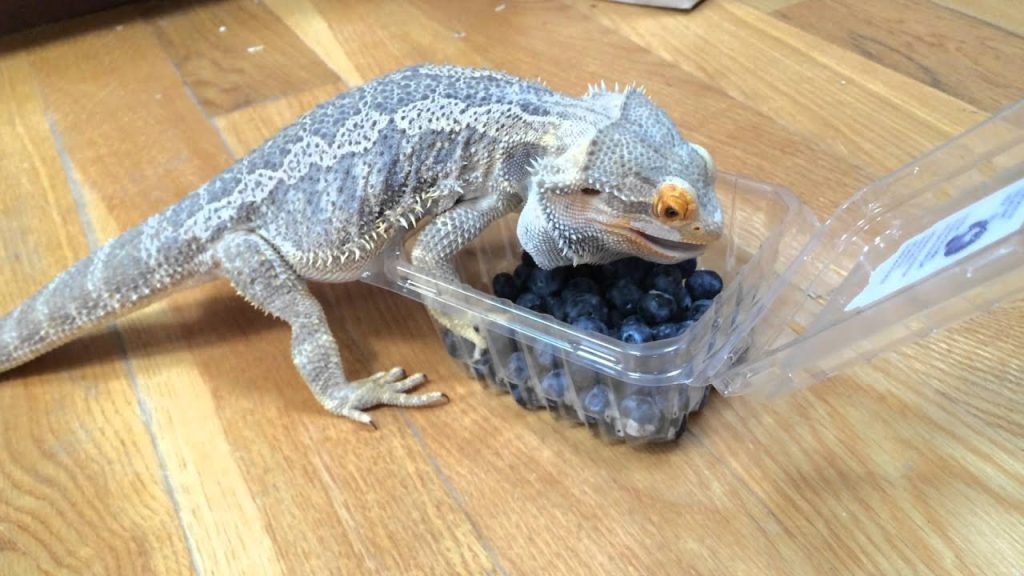
When incorporating mulberries into your bearded dragon’s diet, several cautions should be heeded to ensure their well-being.
Potential Risks And Concerns When Feeding Mulberries
Feeding mulberries to your bearded dragon can offer numerous benefits, but it’s essential to be aware of potential risks and concerns. Some key considerations include
High Sugar Content
Mulberries contain a moderate amount of sugar. While this can be an appealing aspect for your pet due to their sweet taste, excessive sugar intake can lead to obesity and other health issues.
Bearded dragons are prone to metabolic issues, so it’s crucial to offer mulberries in moderation to avoid overloading them with sugar.
Oxalates
Like many fruits and vegetables, mulberries contain oxalates, which can contribute to the formation of kidney stones in some bearded dragons.
While the oxalate content in mulberries is not extremely high, it’s advisable to monitor your pet’s overall oxalate intake and ensure they have proper hydration.
Allergic Reactions
Just as with any new food introduced into your bearded dragon’s diet, there’s a potential for allergic reactions.
While rare, some bearded dragons might not tolerate mulberries well.
Therefore, it’s essential to introduce them gradually and observe your pet for any adverse reactions, such as gastrointestinal upset or changes in behavior.
Moderation, Washing, And Removal Of Stems/Leaves
To safely incorporate mulberries into your bearded dragon’s diet, consider the following guidelines
Moderation
Moderation is key when offering mulberries. Bearded dragons should receive a balanced diet that includes a variety of foods, so mulberries should only be an occasional treat.
They should not constitute the majority of your pet’s diet. A once-a-week or bi-weekly offering can be a reasonable schedule.
Washing
Before feeding mulberries to your bearded dragon, it’s crucial to wash them thoroughly. This helps remove any potential contaminants, such as pesticides or residues, that may be present on the fruit’s surface. Clean produce ensures your pet’s safety.
Removal of Stems and Leaves
Mulberries often come with stems and leaves attached. These parts can be challenging for bearded dragons to digest, so it’s recommended to remove them before feeding. Serving only the ripe, soft berries is the safest and most digestible option.
How To Feed Mulberries To Bearded Dragons?
Feeding mulberries to your bearded dragon can be a rewarding experience when done correctly.
Select Fresh and Ripe Mulberries
Choose fresh and ripe mulberries that are free from mold, signs of spoilage, or visible damage. Quality and freshness are essential to ensure your bearded dragon’s safety and enjoyment.
Cut into Small Pieces (Optional)
While mulberries are generally small and manageable for bearded dragons, you can choose to cut them into smaller pieces. This can be particularly helpful for younger or smaller bearded dragons, making it easier for them to consume the fruit.
Offer in Moderation
Remember that moderation is key when feeding mulberries to your bearded dragon. These fruits should be an occasional treat rather than a primary food source. Limit the number of mulberries you provide during a feeding to prevent overconsumption of sugar.
Observe Your Bearded Dragon
Watch your bearded dragon as they eat the mulberries. Observe their reaction and ensure they can handle the fruit without any issues. Bearded dragons may approach new foods differently, so it’s essential to monitor their response.
Adjust Portion Sizes
The appropriate portion size can vary depending on the size, age, and dietary needs of your bearded dragon. Start with a small portion, such as 2-3 mulberries, and adjust based on your pet’s reaction. Avoid overfeeding to prevent excessive sugar intake.
Maintain a Balanced Diet
Keep in mind that bearded dragons primarily require a diet that consists of leafy greens, vegetables, and a variety of insects. Mulberries should complement their diet as an occasional treat rather than a primary source of nutrition.
Offer Clean Water
Always ensure that your bearded dragon has access to clean, fresh water. Proper hydration is crucial to their overall well-being, and providing a water source is important, especially when introducing new foods like mulberries.
What Are The Alternatives to Mulberries For My Bearded Dragon?
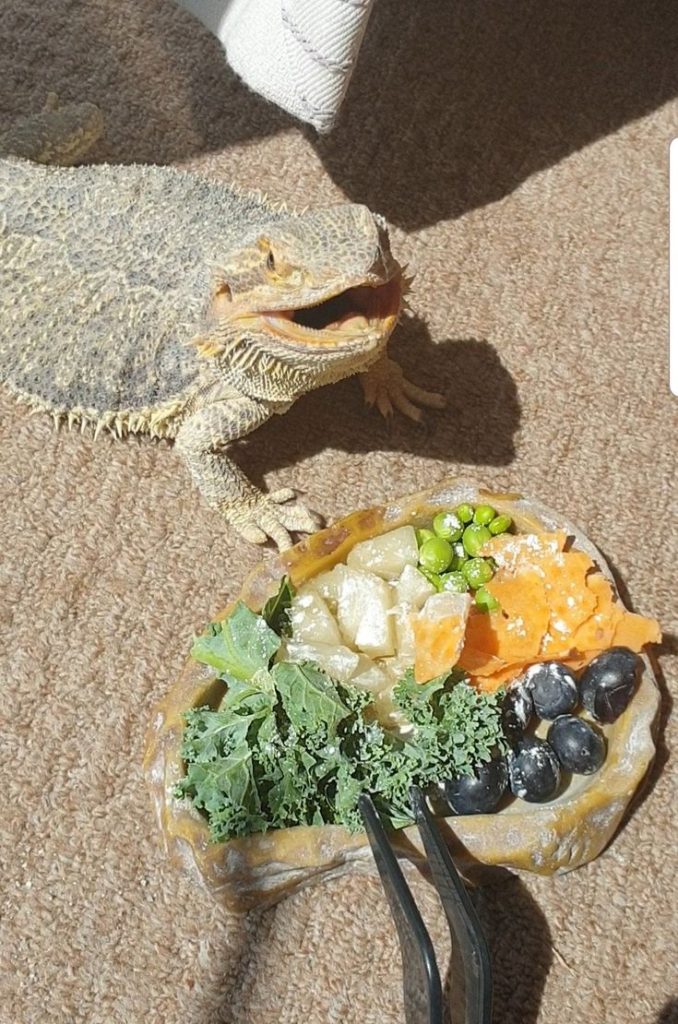
If you’re looking for alternatives to feed your bearded dragon in addition to or instead of mulberries, there are several suitable options. Bearded dragons benefit from a varied diet, so offering a combination of foods is a great way to meet their nutritional needs.
Insects: Insects are a primary source of protein for bearded dragons. Consider offering crickets, dubia roaches, mealworms, superworms, and phoenix worms as part of their diet. These should be appropriately sized for your pet’s age and size.
Leafy Greens: Dark, leafy greens like collard greens, mustard greens, turnip greens, and dandelion greens are rich in essential vitamins and minerals. These should form the foundation of your bearded dragon’s diet.
Other Vegetables: Alongside leafy greens, include a variety of other vegetables such as bell peppers, squash, carrots, and zucchini.
Fruits: Occasional fruits can be offered as treats. Options like papaya, strawberries, and blueberries provide vitamins and some natural sugars. However, these should be given sparingly due to their sugar content.
Edible Flowers: Bearded dragons can enjoy edible flowers like dandelion flowers and hibiscus blossoms. These not only add variety to their diet but are also visually appealing.
Herbs: Fresh herbs like basil, cilantro, and parsley can be introduced in small quantities for added flavor.
Rep-Cal or Miner-All Supplements: To ensure your bearded dragon receives essential vitamins and minerals, consider using calcium and multivitamin supplements. These can be dusted on insects before feeding.
Worms: In addition to insects, you can offer other worms such as silkworms and butterworms, which are well-received by bearded dragons.
Commercial Bearded Dragon Pellets: Some bearded dragon owners also offer high-quality commercial pellets, but these should be used sparingly and as a supplement rather than a primary food source.
FAQ
While bearded dragons can enjoy a variety of fruits in moderation, some fruits are considered toxic to them and should be avoided entirely. Examples of toxic fruits include avocados and rhubarb. It’s crucial to research any new fruit before offering it to your pet.
Bearded dragons can safely eat certain types of berries, including raspberries and blackberries, as occasional treats. These berries can provide a variety of nutrients and are generally well-tolerated in small quantities.
No, bearded dragons should not consume mulberry leaves. While mulberry fruit can be offered in moderation, mulberry leaves are not suitable for their diet. The leaves may contain substances that could be difficult for bearded dragons to digest.
Yes, bearded dragons can consume strawberry leaves in small quantities. However, the leaves should be offered occasionally and as a part of a varied diet. Ensure they are clean and free from pesticides.
Bearded dragons should avoid certain berries like grapes and cherries. These fruits can pose choking hazards and have unfavorable calcium-to-phosphorus ratios. Always exercise caution when introducing new foods.
Bearded dragons may have individual preferences, but many enjoy fruits like papaya, blueberries, and strawberries as occasional treats. Remember that while they love these fruits, they should be offered in moderation due to their sugar content.
Bearded dragons should not eat fruit daily. While they can have fruit as part of their diet, it should be offered in moderation. Daily fruit consumption can lead to excess sugar intake, which is not suitable for their health.
Yes, bearded dragons can have celery as an occasional part of their diet. However, celery is low in nutritional value, so it should be offered in combination with other more nutritious foods. Ensure that it’s finely chopped to avoid choking hazards.
The best protein source for bearded dragons is insects. Crickets, dubia roaches, and mealworms are excellent choices. Insects should be a primary source of protein in their diet and should be gut-loaded for optimal nutrition.
Final Thoughts
On the whole, bearded dragons can enjoy mulberries as a tasty treat, but it’s important to be cautious and offer them in moderation. These sweet berries contain some valuable nutrients, but they can also be high in sugar. To keep your bearded dragon healthy, make sure to wash the mulberries, remove stems and leaves, and feed them alongside a balanced diet of leafy greens, vegetables, and insects.
By following these guidelines, you can offer mulberries as a special snack to keep your bearded dragon happy and thriving. Remember, a little mulberry goes a long way in keeping your scaly friend content and healthy!
